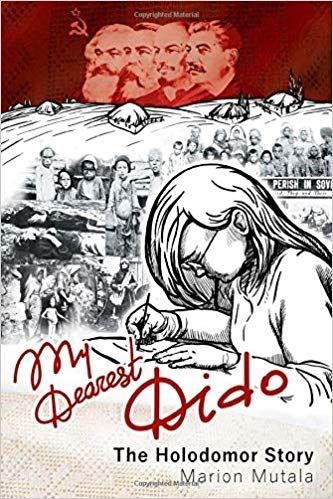My Dearest Dido: The Holodomor Story
by Marion Mutala
Published by Wood Dragon Books
Review by Keith Foster
$19.99�� �� �� �� �� �� �� ISBN 978-1-989078-20-4
Marion Mutala's My Dearest Dido: The Holodomor Story is a passionate account of the Great Ukrainian Famine of 1932-1933, known as the Holodomor. Based on actual events and documented eyewitness accounts, this story consists of correspondence between two fictional characters – Hanusia Hrabowa in Saskatoon and her grandfather, Dido Bohdan, in Hafford, SK, supplemented by Hanusia's personal diary.
As a class assignment to write about the Holodomor, Hanusia does her research using a primary source – her grandfather, or Dido, who survived the famine. Sixteen-year-old Hanusia starts writing to Dido, requesting his assistance, beginning each letter with “My Dearest Dido.”��
Dido is reluctant at first – the memories are just too painful. As he starts to�� open up, he becomes severely ill from the strain of recalling the horror. He recovers with a new purpose in life – to reveal what really happened in Soviet-dominated Ukraine. If no one tells the stories, no one will know. It's a reawakening for Dido and an awakening for Hanusia.
With his life's purpose restored, Dido enthusiastically and energetically reveals what he witnessed. He emphasizes that this was starvation deliberately brought on by Soviet authorities. Soviet soldiers confiscated all grains, selling millions of dollars worth to the West in exchange for hard currency.
In their letters, Dido and Hanusia reveal some startling statistics. An estimated ten million Ukrainians died of starvation, malnutrition, or execution during the Great Ukrainian Famine. About three million of them were children. By June 1933, 30,000 Ukrainians were dying each day.
Mutala has a personal stake in this emotionally wrenching account – she's of Ukrainian descent and has relatives living in Ukraine. She fervently believes that, for the sake of the children and grandchildren, the memory of those who died needs to be forever preserved and honoured.
��




